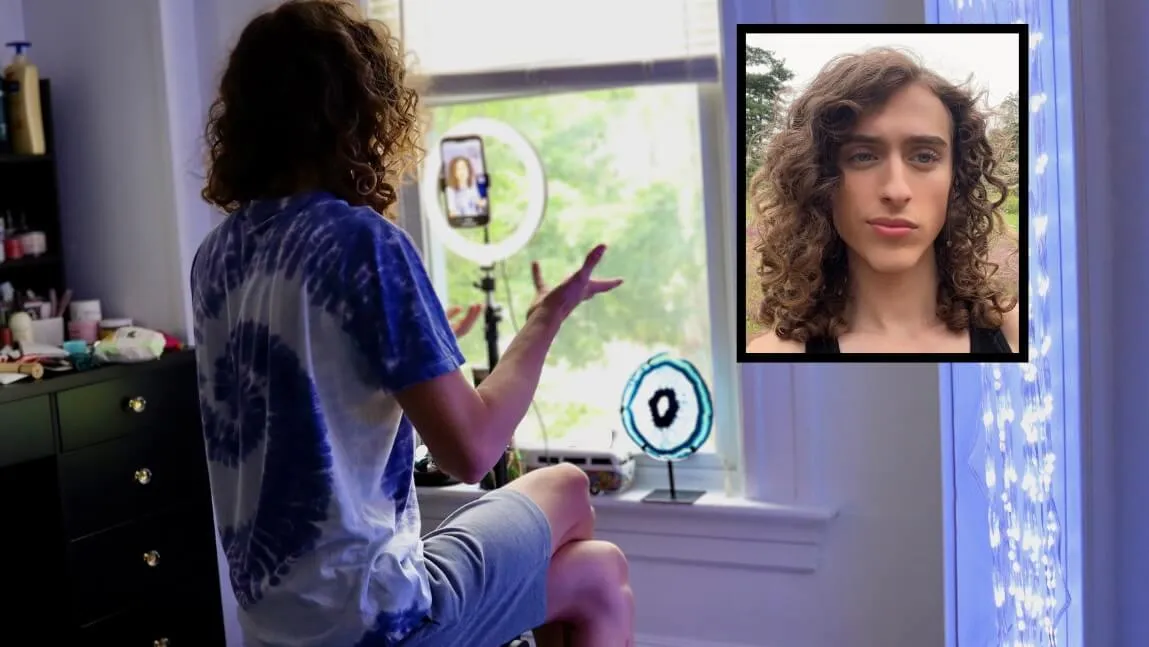You’d think a Political Science, Sociology, and Gender, Sexuality, and Women's Studies triple-major who juggled three jobs while carrying a full course load during the past school year might want to take a break over the summer. But downtime was not on the agenda this year for Zane Zupan, a rising junior from Manchester, VT with a passion for LGBTQ+ history. Instead, having amassed a sizeable TikTok following over the past few years for their thoughtful commentaries on politics and current events, Zupan (who uses the pronouns they/them) applied for and received an award from UVM’s Brennan Summer Research Fellowship Fund to be used for a somewhat unconventional research project.
Called “Making Queer History Accessible to LGBTQ+ Youth During a Period of Targeted Erasure,” Zupan’s project educates viewers about key historical LGBTQ+ events, parsing them into mini history lessons tailor-made for Gen Z. “I designed the project to help make it easier for the younger generations to digest and interact with LGBTQ+ history, which is more important than ever as states across the U.S. actively work to censor this history,” Zupan says. Their goal is to provide young people, especially those in school districts and states in which virtually anything queer-related has been banned or restricted—think books, drag shows, gender-affirming care—with a reliable source of easy-to-digest LGBTQ+ history via TikTok videos.
Zupan chooses their topics based on a combination of personal experience and current events, often riffing on the increasingly oppressive policies that are being enacted with unnerving frequency in the more conservative areas of the country. UVM courses they’ve taken provide a wellspring of ideas, too. “Two classes in particular—Sex in Modern History with Professor Deslandes and LGBT Politics and History with Professor Anderson—have been amazing sources of information and inspiration for this project,” Zupan says. All of this has led to the creation of videos on subjects like the history of the pink triangle, the Reagan Administration’s disastrous response to the AIDS crisis, and even the influence of gender on Western fashion.
Each video takes several days to make from start to finish, and Zupan handles all the aspects solo. They begin by conducting extensive research, taking great care to determine the best angle from which to approach the topic. “I have a lot of experience explaining subjects relating to queer issues to those who aren’t familiar with them,” Zupan says. “Coming from a really conservative family and town, I can usually tell when an argument will hold up to scrutiny.” Next comes script writing, followed by filming and editing. Zupan keeps up a brisk pace, trying to post every five days or so.
This all takes a pretty sizeable dose of courage. Zupan knows that not everyone who watches their videos is open to what they’re trying to teach, especially in such a sharply divided political climate, one in which harsh responses are the norm. “My goal is to create a healthy balance between stirring the pot and getting people to think,” says Zupan, who nevertheless notes they’ve received a number of online threats in response to their posts. “At the end of the day, though, if my words are resonating enough to make them feel uncomfortable, it means I’m doing something right.”
Zupan’s particular genius is in their delivery. Both plainspoken and passionate, they weave historical facts into a narrative that illuminates the through-lines from past movements and events to the queer and social justice issues at play in the world today. The result is a thoughtful, compelling, often personal lesson in an area of history about which most Americans are woefully uninformed—or misinformed. Zupan doesn’t shy away from the hard truths and sad reality that we seem to be moving backward when it comes to LGBTQ+ rights, either.
“The most effective video I’ve created so far was about waves of ‘gay panic’ throughout history,” Zupan says. The episode highlights political and social movements during the second half of the 20th century that particularly vilified LGBTQ+ people. “The similarities between past waves of this rhetoric and the rhetoric that is being spewed by conservatives today is shocking. It’s both horrifying that so little in their approach has changed and comforting that they have lost with this approach before, so they will lose once again.”
Zupan’s work is clearly resonating with their viewers, and the response to the video series has been overwhelmingly positive. The project recently surpassed 200,000 views and has earned over 27,000 likes. What’s more, around 50,000 Gen Zers—Zupan’s target audience—have watched at least one video all the way through from start to finish. But young people aren’t the only ones paying attention. “My favorite moment in this project so far was when an activist who was part of the original movement reached out because they saw my video on the HIV/AIDS epidemic and wanted to tell me how much it meant to them,” Zupan says. “They ended up sending me some original posters from the ACT UP movement, which I immediately framed. They will live on my walls for the rest of my life and inspire me to keep up the good fight.”
Given the current climate, that fight will continue long after this video project comes to an end. When asked how they stay positive while wrestling with such difficult topics, Zupan replies that they don’t. “For queer people in the U.S. today, the first thing we see on our phone in the morning is often a headline about our rights being stripped away,” they point out. “So, I lean into the fear and anger of the current moment and use it to fight back.” Zupan realizes that complacency and inaction are not an option—and they’re looking to build an army of resistors. “I’m calling on all allies to our community to take a fierce, public stance against the hateful rhetoric against LGBTQ+ people so that all members of our community can afford to live in positivity.”
